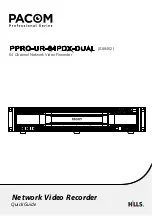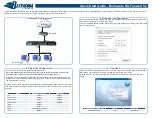
62
For each rule, you can define:
•
Source IP address
•
Destination IP address
•
Destination port address
•
Protocol: TCP or UDP or both.
Parameters Description
Outbound
Check/uncheck Enable to enable/disable the Packet Filtering.
Packet Filter
Outbound Filter applies to all outbound packets but Inbound Filter
applies only to packets that are destined to Virtual Servers or
DMZ host.
Allow / Deny all to pass except
Please select “Allow” or “Deny” to decide the behavior of packet
those that match the following rules
filtering table. If you select allow, all traffic will be allowed except
that the Source IP addresses listed in filtering table will be
rejected to connect to the destination IP addresses and ports. If
you select deny, all traffic will be denied except that the Source IP
address listed in filtering table will be allowed to connect to the
destination IP addresses and ports.
Source IP
Please input the client’s IP address you wish to apply the filtering
rule. You can input a single IP address (192.168.2.10) or a range
of IP addresses (192.168.2.10-192.168.2.50). Leaving this field
blank indicates all IP addresses.
Destination IP
Please input the Destination IP address (i.e. an FTP site, Email
server, etc.) you wish to apply the filtering. You can input a single
IP address (192.168.2.10) or a range of IP addresses
(192.168.2.10-192.168.2.50), leaving this field blank means all IP
addresses.
Port
Please input the port number here. You can define a single port
(80) or a range of ports (1000-1999). Add prefix "T" or "U" to
specify TCP or UDP protocol, for example, T80, U53,
U2000-2999. No prefix indicates both TCP and UDP are defined.
Leaving this field blank indicates all ports.
Enable
Check/uncheck Enable to enable/disable each Packet Filtering
rule.
Schedule Rule#
Enter a Schedule Rule number to activate the filtering rule only
within the desired time frame. Please refer to
3.4.7 Schedule
















































